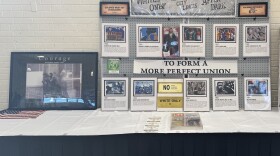North Carolina residents voting in this year’s election will see a constitutional amendment on their ballot. The question: Should only a citizen be able to vote in any election in the state?
Republican lawmakers in the North Carolina General Assembly passed House Bill 1074 in June. The bill puts the constitutional amendment up for a vote in November’s general election.
Wendy Mateo-Pascual, coordinator of the Latino Civic Engagement Committee, doesn’t feel the amendment is needed.
“I’m concerned with this — that people that are naturalized think that they cannot vote and they don’t go, but also that in the future, other changes can happen and say that only people born in the United States are citizens,” Mateo-Pascual said.
The wording in the North Carolina Constitution would be changed to read, “Only a citizen of the United States" can vote. Currently, the Constitution states that “every person born in the United States and every person who has been naturalized” can vote.
“If you read in the ballot, you will agree, you will say, ‘yes, only citizens can vote,’” Mateo-Pascual said. “But most of the people don’t know that they are taking out part of the language.”
A poll conducted by the Carolina Journal in September found that about 76% of voters would support the amendment, with only about 13% opposing it. An overwhelming majority of Republicans (96%) and a narrow majority of Democrats (56%) are in support.
Immigration attorney Jamilah Espinosa says the amendment is designed to stir up anti-immigrant sentiment, rather than solve a real problem.
“It seems very harmless, but there are nefarious motives behind trying to do this constitutional amendment,” Espinosa said.
Some cities in Maryland, California, and Vermont, as well as Washington, D.C., allow noncitizens to vote — but only in local elections, not in federal and state elections. No city or county in North Carolina allows noncitizens to vote.
“It’s really important that our community understands that in local elections, like school boards, mayor races, all of that throughout the state of North Carolina, you still have to be a U.S. citizen to vote in those elections,” Espinosa said.
According to the North Carolina State Board of Elections, there were only six complaints of noncitizens casting ballots in the 2020 general election and the 2021 municipal election. Noncitizens who register to vote or attempt to vote could be charged with a Class I felony, which can result in three to 12 months in prison.
“Most people that are migrants, most people that are lawful permanent residents, understand that there are serious consequences that come with trying to vote or even registering,” Espinosa said.
Dr. Andy Jackson, of the John Locke Foundation, a conservative think tank, acknowledges the number of noncitizens voting is low. But he said it’s still important to tighten language in the constitution to avoid discrepancies in the future.
“A judge leading up to the North Carolina Supreme Court can decide no, the North Carolina Constitution doesn’t really speak to whether or not noncitizens can vote,” Jackson said.
Jackson says the goal of the amendment is to protect the law from being changed by judicial decisions rather than target noncitizens, although supporters do not want noncitizens voting.
“Who gets to vote, (and) who doesn’t get to vote is a fundamental question in our Republic here in North Carolina, and it’s such a fundamental question that a clear answer belongs in the Constitution,” Jackson said.







